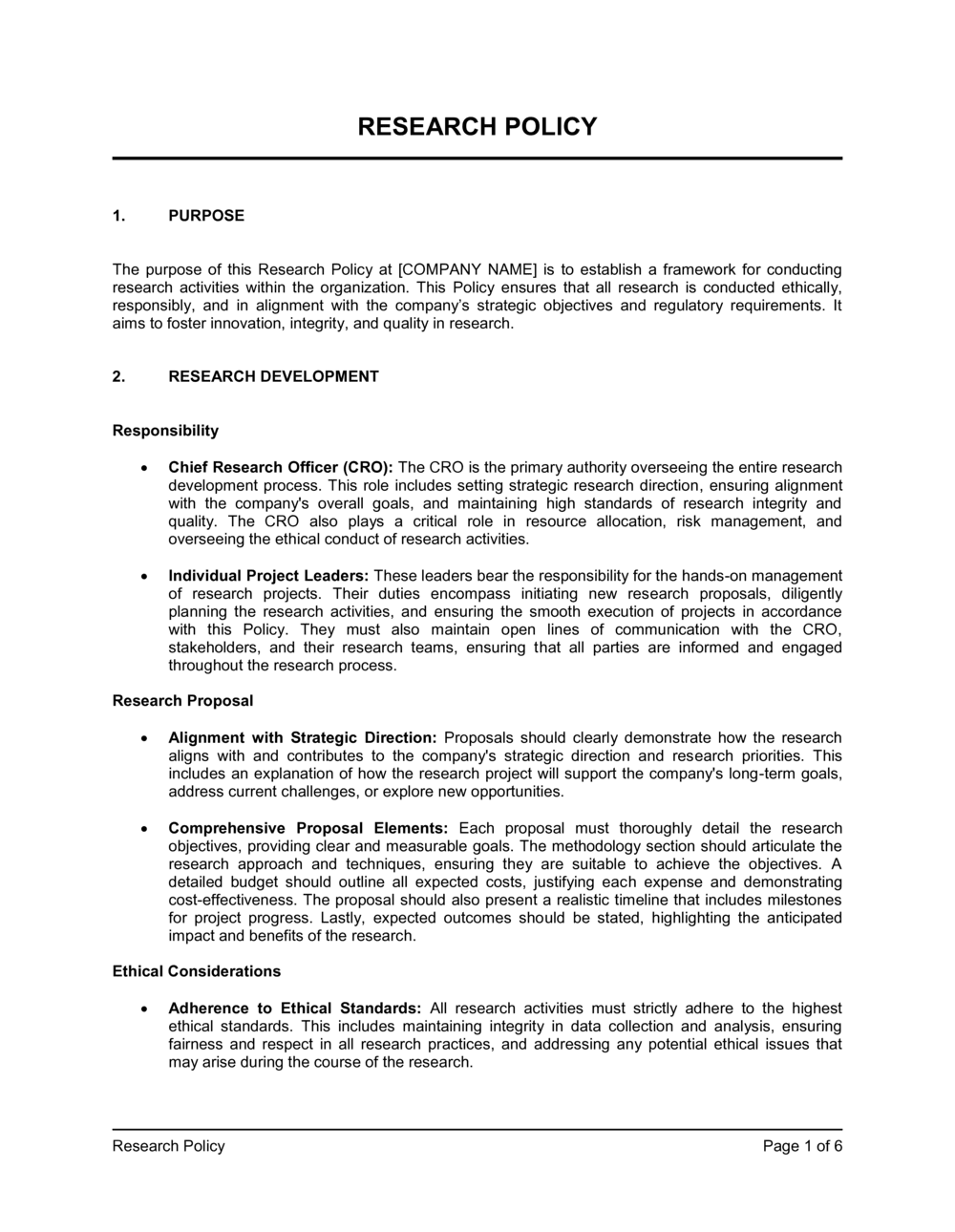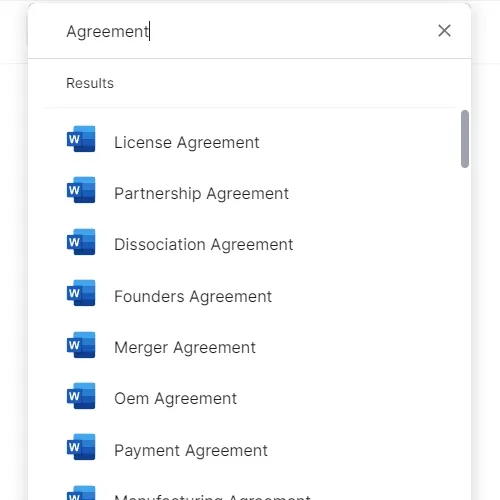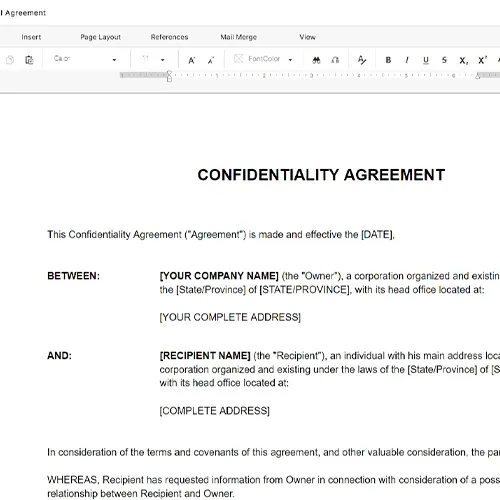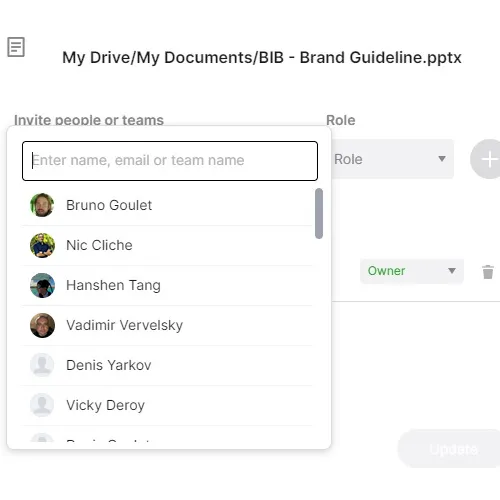Research Policy Template

Document content
This research policy template has 6 pages and is a MS Word file type listed under our human resources documents.
Sample of our research policy template:
RESEARCH POLICY PURPOSE The purpose of this Research Policy at [COMPANY NAME] is to establish a framework for conducting research activities within the organization. This Policy ensures that all research is conducted ethically, responsibly, and in alignment with the company's strategic objectives and regulatory requirements. It aims to foster innovation, integrity, and quality in research. RESEARCH DEVELOPMENT Responsibility Chief Research Officer (CRO): The CRO is the primary authority overseeing the entire research development process. This role includes setting strategic research direction, ensuring alignment with the company's overall goals, and maintaining high standards of research integrity and quality. The CRO also plays a critical role in resource allocation, risk management, and overseeing the ethical conduct of research activities. Individual Project Leaders: These leaders bear the responsibility for the hands-on management of research projects. Their duties encompass initiating new research proposals, diligently planning the research activities, and ensuring the smooth execution of projects in accordance with this Policy. They must also maintain open lines of communication with the CRO, stakeholders, and their research teams, ensuring that all parties are informed and engaged throughout the research process. Research Proposal Alignment with Strategic Direction: Proposals should clearly demonstrate how the research aligns with and contributes to the company's strategic direction and research priorities. This includes an explanation of how the research project will support the company's long-term goals, address current challenges, or explore new opportunities. Comprehensive Proposal Elements: Each proposal must thoroughly detail the research objectives, providing clear and measurable goals. The methodology section should articulate the research approach and techniques, ensuring they are suitable to achieve the objectives. A detailed budget should outline all expected costs, justifying each expense and demonstrating cost-effectiveness. The proposal should also present a realistic timeline that includes milestones for project progress. Lastly, expected outcomes should be stated, highlighting the anticipated impact and benefits of the research. Ethical Considerations Adherence to Ethical Standards: All research activities must strictly adhere to the highest ethical standards. This includes maintaining integrity in data collection and analysis, ensuring fairness and respect in all research practices, and addressing any potential ethical issues that may arise during the course of the research. Intellectual Property Rights: Researchers must respect intellectual property rights at all times. This involves appropriately citing sources, obtaining necessary permissions for use of existing work, and ensuring that any collaborations or use of external resources comply with legal and ethical standards. Human and Animal Subjects: Research involving human or animal subjects requires special attention. Proposals for such research must include detailed plans for the ethical treatment of subjects, ensuring their welfare and rights are protected. These proposals must be submitted to the Ethics Committee for thorough review and approval. The committee will assess aspects such as consent processes, potential risks to subjects, and the overall ethical implications of the research. RESEARCH APPROVAL Review and Approval Proposal Evaluation by Research Committee: The Research Committee, composed of experienced members from various relevant fields, is tasked with a thorough review of each research proposal. This committee evaluates the proposals for their scientific and strategic relevance to the company's objectives, feasibility in terms of technical and resource requirements, and adherence to ethical standards. This includes a detailed assessment of the proposed methodology, potential risks, and the capability of the research team. Criteria for Evaluation: The evaluation criteria include the potential for innovation, the likelihood of successful completion, the expected impact, and the alignment with the company's short-term and long-term strategic goals. The committee may request additional information or revisions from the project leaders to ensure all aspects of the proposal meet the required standards. Final Approval: Upon a positive recommendation from the Research Committee, the final approval for the project is granted by the Chief Research Officer. In cases involving significant financial investment, high risk, or substantial strategic importance, the proposal may also be presented to the Board of Directors for their approval. This ensures that top-level management is directly involved in major research decisions, aligning them with the company's broader vision and objectives. Funding Allocation Allocation Based on Budget Proposals: Once a project is approved, funding is allocated based on the detailed budget outlined in the proposal. This funding is intended to cover all necessary expenses such as personnel costs, equipment, materials, and any other resources identified as essential for the successful completion of the project. Management of Resources: The Finance Department, in collaboration with the CRO, ensures that the allocated resources are available and managed efficiently. This involves monitoring the expenditure against the budget throughout the project lifecycle to avoid overruns and ensure financial accountability. External Funding and Compliance: If external funding sources, such as grants, partnerships, or sponsorships, are utilized, these must be fully disclosed in the proposal. All external funds are subject to the company's conflict of interest policies to maintain transparency and integrity. The company must ensure that accepting external funding does not impede its independence or violate any legal or ethical standards. Additionally, agreements with external funders must be carefully reviewed to align with the company's research objectives and policies. RESEARCH IMPLEMENTATION Responsibility Role of Project Leaders: Project leaders are central to the successful implementation of research projects. They are tasked with managing the day-to-day activities of the research, ensuring that the team adheres to the approved research plan and budget. This includes coordinating team efforts, overseeing resource allocation, and ensuring that the project remains on track with its objectives. Project leaders also serve as the primary point of contact between the research team and the company's senior management or Research Committee. Ensuring Compliance and Quality: Project leaders must ensure that all research activities comply with internal policies and external regulations, particularly in areas such as data handling, ethical standards, and safety protocols. They are also responsible for maintaining high standards of quality and accuracy in the research process, from data collection to analysis. Progress Monitoring Regular Reporting: Project leaders are required to submit regular progress reports to the Research Committee. These reports should provide comprehensive updates on the project's status, including achievements, any challenges or obstacles encountered, and the use of resources. The frequency of these reports is typically determined by the project's scope and duration, but they are usually expected on a monthly, quarterly, or milestone basis. Review by Research Committee: The Research Committee reviews these progress reports to monitor the project's advancement against its objectives and timelines. The committee evaluates whether the project is on course to meet its goals and whether the resources are being utilized effectively and efficiently. They also assess any risks or issues that may affect the project's successful completion.
3,000+ Templates & Tools to Help You Start, Run & Grow Your Business

Document content
This research policy template has 6 pages and is a MS Word file type listed under our human resources documents.
Sample of our research policy template:
RESEARCH POLICY PURPOSE The purpose of this Research Policy at [COMPANY NAME] is to establish a framework for conducting research activities within the organization. This Policy ensures that all research is conducted ethically, responsibly, and in alignment with the company's strategic objectives and regulatory requirements. It aims to foster innovation, integrity, and quality in research. RESEARCH DEVELOPMENT Responsibility Chief Research Officer (CRO): The CRO is the primary authority overseeing the entire research development process. This role includes setting strategic research direction, ensuring alignment with the company's overall goals, and maintaining high standards of research integrity and quality. The CRO also plays a critical role in resource allocation, risk management, and overseeing the ethical conduct of research activities. Individual Project Leaders: These leaders bear the responsibility for the hands-on management of research projects. Their duties encompass initiating new research proposals, diligently planning the research activities, and ensuring the smooth execution of projects in accordance with this Policy. They must also maintain open lines of communication with the CRO, stakeholders, and their research teams, ensuring that all parties are informed and engaged throughout the research process. Research Proposal Alignment with Strategic Direction: Proposals should clearly demonstrate how the research aligns with and contributes to the company's strategic direction and research priorities. This includes an explanation of how the research project will support the company's long-term goals, address current challenges, or explore new opportunities. Comprehensive Proposal Elements: Each proposal must thoroughly detail the research objectives, providing clear and measurable goals. The methodology section should articulate the research approach and techniques, ensuring they are suitable to achieve the objectives. A detailed budget should outline all expected costs, justifying each expense and demonstrating cost-effectiveness. The proposal should also present a realistic timeline that includes milestones for project progress. Lastly, expected outcomes should be stated, highlighting the anticipated impact and benefits of the research. Ethical Considerations Adherence to Ethical Standards: All research activities must strictly adhere to the highest ethical standards. This includes maintaining integrity in data collection and analysis, ensuring fairness and respect in all research practices, and addressing any potential ethical issues that may arise during the course of the research. Intellectual Property Rights: Researchers must respect intellectual property rights at all times. This involves appropriately citing sources, obtaining necessary permissions for use of existing work, and ensuring that any collaborations or use of external resources comply with legal and ethical standards. Human and Animal Subjects: Research involving human or animal subjects requires special attention. Proposals for such research must include detailed plans for the ethical treatment of subjects, ensuring their welfare and rights are protected. These proposals must be submitted to the Ethics Committee for thorough review and approval. The committee will assess aspects such as consent processes, potential risks to subjects, and the overall ethical implications of the research. RESEARCH APPROVAL Review and Approval Proposal Evaluation by Research Committee: The Research Committee, composed of experienced members from various relevant fields, is tasked with a thorough review of each research proposal. This committee evaluates the proposals for their scientific and strategic relevance to the company's objectives, feasibility in terms of technical and resource requirements, and adherence to ethical standards. This includes a detailed assessment of the proposed methodology, potential risks, and the capability of the research team. Criteria for Evaluation: The evaluation criteria include the potential for innovation, the likelihood of successful completion, the expected impact, and the alignment with the company's short-term and long-term strategic goals. The committee may request additional information or revisions from the project leaders to ensure all aspects of the proposal meet the required standards. Final Approval: Upon a positive recommendation from the Research Committee, the final approval for the project is granted by the Chief Research Officer. In cases involving significant financial investment, high risk, or substantial strategic importance, the proposal may also be presented to the Board of Directors for their approval. This ensures that top-level management is directly involved in major research decisions, aligning them with the company's broader vision and objectives. Funding Allocation Allocation Based on Budget Proposals: Once a project is approved, funding is allocated based on the detailed budget outlined in the proposal. This funding is intended to cover all necessary expenses such as personnel costs, equipment, materials, and any other resources identified as essential for the successful completion of the project. Management of Resources: The Finance Department, in collaboration with the CRO, ensures that the allocated resources are available and managed efficiently. This involves monitoring the expenditure against the budget throughout the project lifecycle to avoid overruns and ensure financial accountability. External Funding and Compliance: If external funding sources, such as grants, partnerships, or sponsorships, are utilized, these must be fully disclosed in the proposal. All external funds are subject to the company's conflict of interest policies to maintain transparency and integrity. The company must ensure that accepting external funding does not impede its independence or violate any legal or ethical standards. Additionally, agreements with external funders must be carefully reviewed to align with the company's research objectives and policies. RESEARCH IMPLEMENTATION Responsibility Role of Project Leaders: Project leaders are central to the successful implementation of research projects. They are tasked with managing the day-to-day activities of the research, ensuring that the team adheres to the approved research plan and budget. This includes coordinating team efforts, overseeing resource allocation, and ensuring that the project remains on track with its objectives. Project leaders also serve as the primary point of contact between the research team and the company's senior management or Research Committee. Ensuring Compliance and Quality: Project leaders must ensure that all research activities comply with internal policies and external regulations, particularly in areas such as data handling, ethical standards, and safety protocols. They are also responsible for maintaining high standards of quality and accuracy in the research process, from data collection to analysis. Progress Monitoring Regular Reporting: Project leaders are required to submit regular progress reports to the Research Committee. These reports should provide comprehensive updates on the project's status, including achievements, any challenges or obstacles encountered, and the use of resources. The frequency of these reports is typically determined by the project's scope and duration, but they are usually expected on a monthly, quarterly, or milestone basis. Review by Research Committee: The Research Committee reviews these progress reports to monitor the project's advancement against its objectives and timelines. The committee evaluates whether the project is on course to meet its goals and whether the resources are being utilized effectively and efficiently. They also assess any risks or issues that may affect the project's successful completion.
Easily Create Any Business Document You Need in Minutes.

Access over 3,000+ business and legal templates for any business task, project or initiative.

Customize your ready-made business document template and save it in the cloud.

Share your files and folders with your team. Create a space of seamless collaboration.
Templates and Tools to Manage Every Aspect of Your Business.
Business in a Box Covers Every Business Department
Includes 16 Types of Business Documents You Need
and Achieve Your Business Goals Faster.
